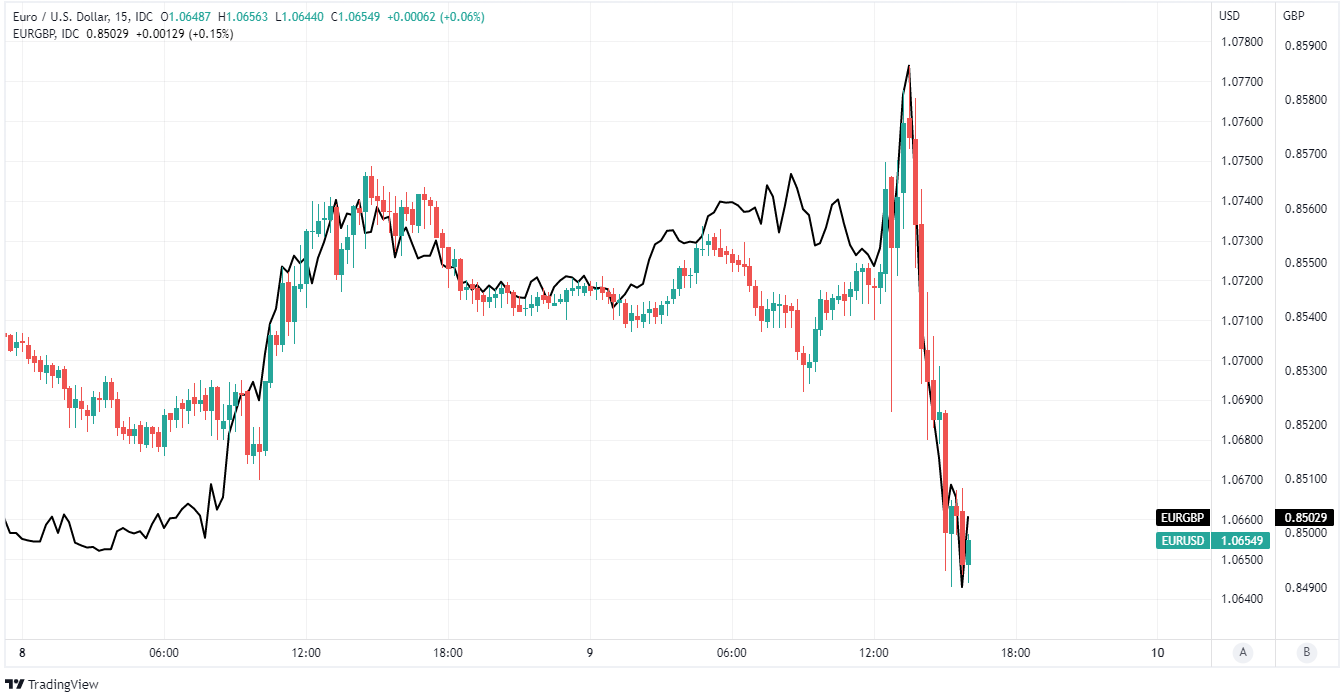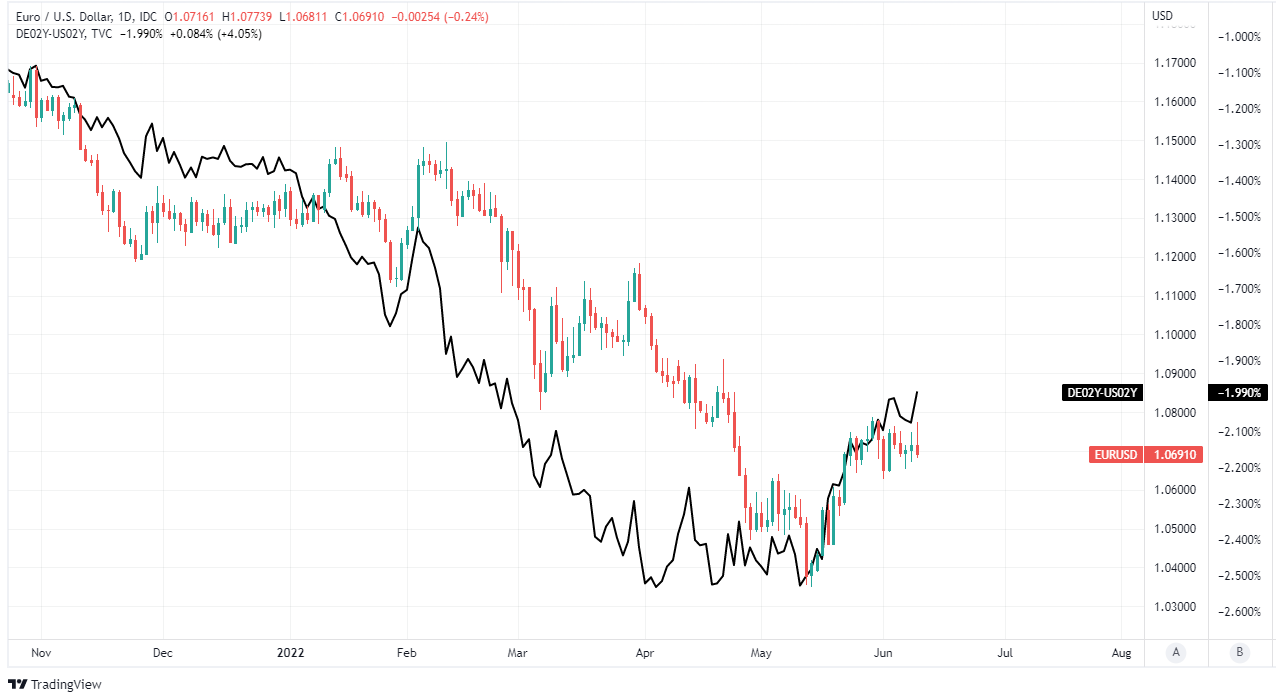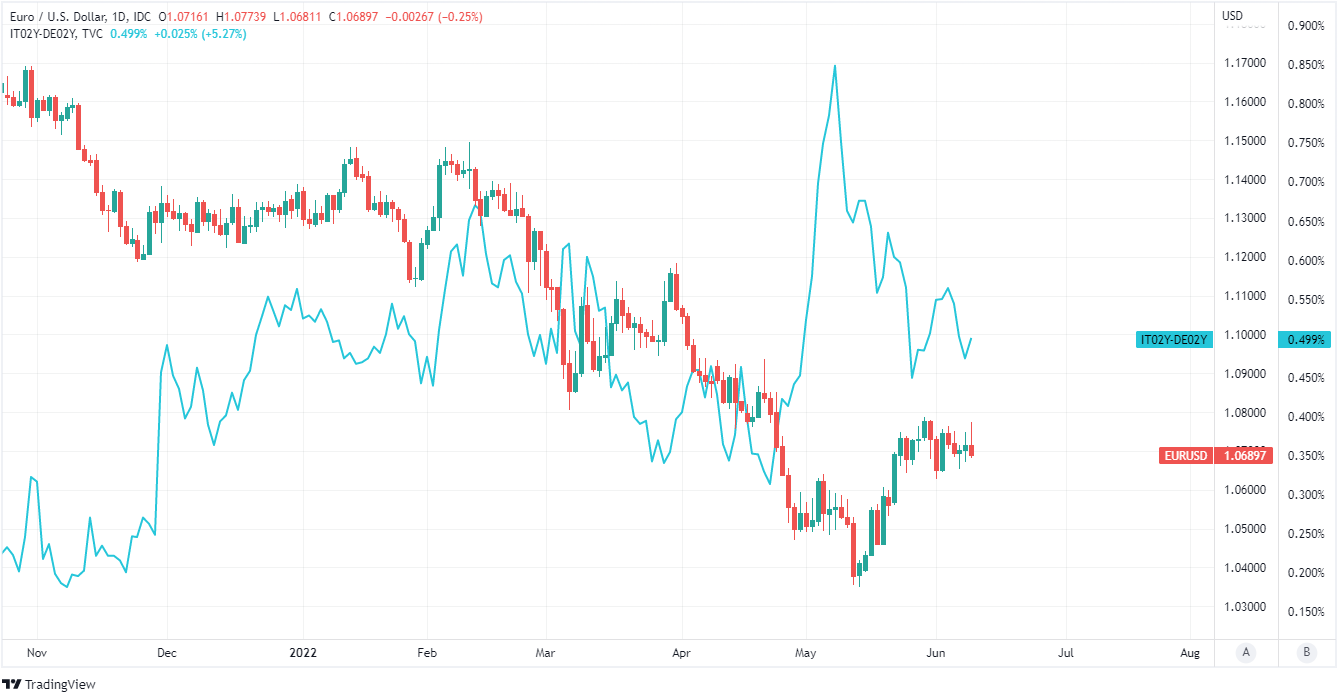Euro-Dollar Slides as Open Questions and ECB’s Optionality Loom Over Outlook
- Written by: James Skinner
“As I said, the decisions that we have made today are not just one intention for one single month of July. It’s a whole journey that will take us back to the two percent target in the medium-term,” - ECB President Christine Lagarde.

© European Central Bank, reproduced under CC licensing
The Euro to Dollar exchange rate eventually slumped in the hours after the June European Central Bank’s (ECB) policy decision as open questions and engineered optionality appeared to outweigh for the market what otherwise had the makings of a bullish ECB interest rate outlook.
Europe’s single currency whipsawed in volatile trading before sliding lower when the ECB left open a series of important questions about the interest rate outlook in Europe, ensuring in the process that it retains a coveted degree of optionality relating to future decisions.
In short, the ECB preannounced a decision to lift all of its interest rates by 0.25% in July and gave carefully worded guidance that created room for the bank to proceed in increments of 0.50% or larger as soon as this September.
However, the press conference made clear that there are circumstances in which interest rates could struggle to keep up with recently escalating market expectations, which potentially explains the declines in the Euro.
“We are on a path to exit negative interest rates soon. It is good practice and it is often done by central banks around the world to start with an incremental increase that is sizable, not excessive and that indicates a path,” President Christine Lagarde told reporters.
 Above: Euro to Dollar rate shown at 15-minute intervals alongside EUR/GBP. Click image for closer inspection.
Above: Euro to Dollar rate shown at 15-minute intervals alongside EUR/GBP. Click image for closer inspection.
Compare EUR to USD Exchange Rates
Find out how much you could save on your euro to US dollar transfer
Potential saving vs high street banks:
$2,750.00
Free • No obligation • Takes 2 minutes
“As I said, the decisions that we have made today are not just one intention for one single month of July. It’s a whole journey that will take us back to the two percent target in the medium-term. We also want to observe how markets are going to operate and as I have mentioned, we couple our July determination with our September indication,” she added.
All of this came after the ECB announced significant upgrades to its forecasts for inflation, which is now expected to sit at 2.1% in 2024.
That’s above the 2% target, although not by as much as the core inflation rate, which is expected to sit somewhat higher than that at 2.3%.
Those are inflation forecasts that leave the ECB with little choice but to begin lifting its interest rate, and even more so given the forecast for the core inflation rate, which overlooks volatile as well as imported food and energy costs.
“Throughout this process the Governing Council will maintain optionality, data dependency, gradualism and flexibility in the conduct of monetary policy. All four will matter and there will be circumstances when one might be more important than the other and there might be other circumstances where the pecking order might change,” President Lagarde said.
 Above: EUR/USD shown at daily intervals with spread or gap between yields of 02-year German and U.S. government bonds. Click image for closer inspection.
Above: EUR/USD shown at daily intervals with spread or gap between yields of 02-year German and U.S. government bonds. Click image for closer inspection.
Compare EUR to USD Exchange Rates
Find out how much you could save on your euro to US dollar transfer
Potential saving vs high street banks:
$2,750.00
Free • No obligation • Takes 2 minutes
“We’re trying to have as much optionality as we can. Be able to use flexibility if and when warranted and necessary. Be as data dependent as we have demonstrated and will continue to demonstrate. And also be able to deploy the gradualism that will be appropriate given the circumstances,” she added.
"And I think in times of great uncertainty, gradualism is probably appropriate more so than if the path is clear, well identified and we all understand where we are heading," President Lagarde also said.
The ECB’s announcement was followed by an uplift to market-implied measures of expectations for the ECB’s interest rates, which have since come to suggest that investors and traders are anticipating a total 1.4% increase in European interest rates before year-end.
This might have been supportive of Euro exchange rates if not for the plentiful optionality retained by the ECB and the preferred gradualist approach to lifting interest rates that was telegraphed as being most appropriate on Thursday.
Just as notably for the Euro, however, was the announcement of a mechanism that is intended to neutralise investor concerns about financial fragmentation risks in Southern Europe during the period when interest rates are rising.
“I just want to reiterate that within our mandate we are committed to preventing fragmentation risks in the Euro area. Fragmented financial markets would obstruct the monetary policy transmission and undermine the possibility for the ECB to achieve its price stability mandate,” President Lagarde told reporters.
 Above: Euro to Dollar rate shown at daily intervals with spread or gap between yields of 02-year Italian and German government bonds. Click image for closer inspection.
Above: Euro to Dollar rate shown at daily intervals with spread or gap between yields of 02-year Italian and German government bonds. Click image for closer inspection.
Compare EUR to USD Exchange Rates
Find out how much you could save on your euro to US dollar transfer
Potential saving vs high street banks:
$2,750.00
Free • No obligation • Takes 2 minutes
“There is no specific level of yield increase or lending rates or bond spreads that can unconditionally trigger this or that,” she added.
"The principle is that we will not tolerate fragmentation that would impair monetary policy transmission and we will determine on the basis of the circumstances of countries how and when that risk is likely to materialise, and we will prevent it," she explained.
The ECB said it will turn its €1.85 trillion Pandemic Emergency Purchase Programme bond portfolio into a form of backstop intended to mitigate the "fragmentation risk" that could arise in Southern Europe as interest rates rise.
It would do this by taking the money it receives from governments each time a bond on its balance sheet reaches maturity, and reinvesting it wherever and whenever it's necessary to prevent financing costs from rising in a disproportionate, disorderly or disruptive manner.
This is due to the risk of adverse financial and economic consequences that can arise when the market’s perception of differences in creditworthiness among European governments leads some bond markets to be treated differently to others, which has implications for financing costs.
These fragmentation risks have in the past threatened some countries’ access to debt markets and taken a toll on the single currency, hence why they were addressed preemptively by the ECB on Thursday.




